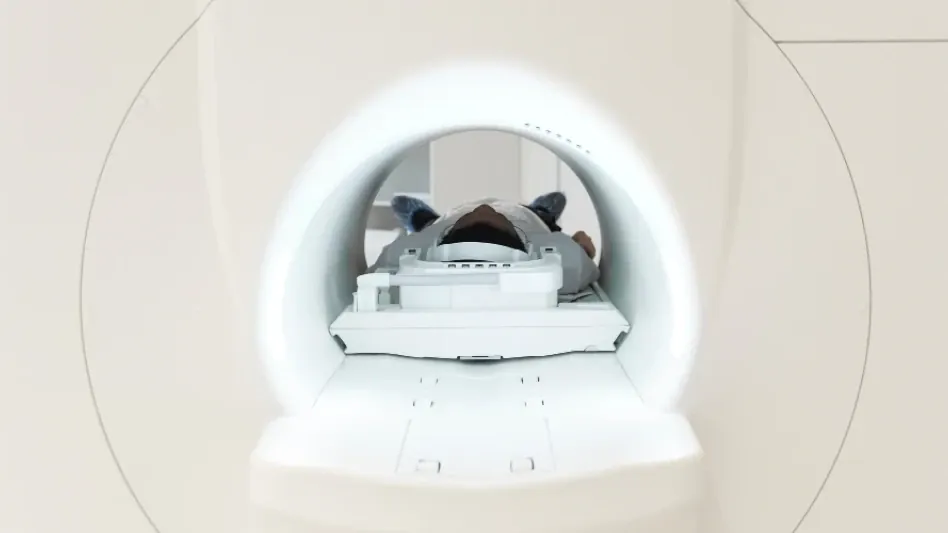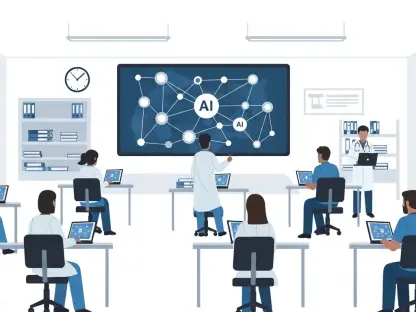Magnetic Resonance Imaging (MRI) machines have long been considered the gold standard for non-invasive diagnostic imaging, but the extensive time required for each scan has posed significant challenges. Current MRI scans can take up to 45 minutes, causing discomfort and difficulties for patients with medical conditions or claustrophobia. Dr. Sadegh Raeisi, co-founder and CEO of Foqus Technologies, is on a mission to revolutionize MRI efficiency using quantum algorithms and machine learning, potentially reducing scan times to a mere five minutes.
The Challenge of Prolonged MRI Scans
Current Limitations and Patient Discomfort
The extended duration of MRI scans has a direct impact on patient experience, particularly for those who experience discomfort or anxiety during the procedure. Claustrophobia, common in closed MRI machines, can significantly exacerbate these issues, making the process even more challenging for patients. Furthermore, individuals with conditions requiring frequent imaging, such as Parkinson’s disease or chronic illnesses, face repeated inconveniences that affect their quality of life. These factors make it essential to explore innovations that can minimize scan durations without compromising image quality.
MRI scans generate detailed images of the body’s internal structures by using strong magnetic fields, radio waves, and computer processing. Despite its high accuracy compared to CT and PET scans, MRI technology still struggles with accessibility issues. This is especially true for underrepresented communities and pediatric patients who may find the extended scan times particularly difficult to endure. The need for faster, more efficient imaging solutions is not just about improving patient comfort—it is also about ensuring that critical diagnostic tools are available to a broader population.
Technological Barriers and Accessibility Issues
The technological demands of MRI machines contribute to their lengthy scan times, which can be particularly problematic in regions with limited healthcare resources. In Canada, for example, the wait time for an MRI scan can average around 90 days. This delay is not only inconvenient but also potentially detrimental to patient health, as timely diagnosis and treatment are crucial. The prolonged wait times also place a heavy burden on healthcare providers, contributing to burnout and reducing the overall efficiency of the medical system.
Foqus Technologies, under Raeisi’s leadership, aims to address these barriers by developing software that leverages quantum algorithms to enhance MRI capabilities. The software seeks to extract quantum entropy from body molecules, resulting in stronger signals and smarter scans. This innovation has the potential to significantly reduce scan times while maintaining or even improving the quality of imaging. By making MRI more accessible and efficient, Foqus Technologies could alleviate some of the systemic issues currently affecting patient care and provider well-being.
Innovation Through Quantum Algorithms
Development of Quantum-Enhanced MRI Software
Raeisi’s innovative approach is rooted in his experiences at the Institute for Quantum Computing at Waterloo, where he was exposed to cutting-edge research and leading scientists in the field. This environment fostered a desire to apply quantum technologies to practical problems in medical imaging. The development of Foqus Technologies’ software began in 2021, focusing on creating a prototype that could be tested and refined within the medical community.
With support from Waterloo’s Velocity incubator and collaboration with the Robarts Research Institute through the BioNEXT program, Foqus Technologies has made significant strides in advancing their project. The team received invaluable guidance from advisors at Velocity, including former founders who provided expertise and insights crucial for navigating the path to market entry. This collaborative environment has been instrumental in shaping the development and testing phases of the software.
Validation and Pilot Testing
A crucial step in bringing Foqus Technologies’ innovation to market has been the validation and pilot testing of their software. The software has been rigorously tested on over 20,000 MRI images, ensuring its accuracy and reliability in a clinical setting. Radiologists have played a key role in this process, providing essential feedback and affirming the software’s potential to revolutionize MRI scans. The ongoing process of FDA approval marks a significant milestone towards the broader adoption of this technology in hospitals and medical facilities worldwide.
Foqus Technologies envisions a future where quantum algorithms not only reduce scan times but also enhance the sensitivity and diagnostic capabilities of MRI machines. By providing deeper insights into metabolites and other body molecules, this advancement could elevate MRI technology to new heights, allowing for earlier and more accurate disease detection. The ultimate goal is to achieve global adoption of this software, making advanced medical imaging accessible to a wider population and enhancing the overall efficiency of healthcare systems.
Future Implications and Considerations
Impact on Healthcare Accessibility and Efficiency
The potential benefits of quantum-enhanced MRI technology extend beyond patient experience to the broader healthcare system. By significantly reducing scan times, the technology could help alleviate some of the bottlenecks and inefficiencies currently plaguing medical imaging departments. This improvement would not only enhance patient care but also reduce the workload for healthcare providers, contributing to a more sustainable and effective medical system.
Moreover, the increased accessibility of MRI scans could facilitate earlier diagnosis and treatment of various conditions, ultimately improving patient outcomes. For underrepresented communities and regions with limited healthcare resources, this technological advancement could be particularly transformative, bridging gaps in medical imaging availability and ensuring that high-quality diagnostic tools are within reach for more people.
Broader Applications of Quantum Algorithms
Magnetic Resonance Imaging (MRI) machines are renowned as the gold standard in non-invasive diagnostic imaging. However, one major issue is the lengthy time required for each scan, which can extend up to 45 minutes. This prolonged duration often leads to discomfort and challenges for patients, particularly those with certain medical conditions or claustrophobia. Addressing these concerns, Dr. Sadegh Raeisi, co-founder and CEO of Foqus Technologies, is spearheading an initiative to significantly enhance MRI efficiency. By leveraging quantum algorithms and machine learning, his team aims to potentially slash scan times to just five minutes. This groundbreaking improvement could make MRI scans more comfortable and accessible for a broader range of patients, ultimately revolutionizing the field of diagnostic imaging. Such advancements hold promise for reducing patient anxiety, improving throughput in medical facilities, and enhancing overall diagnostic accuracy and patient care.









